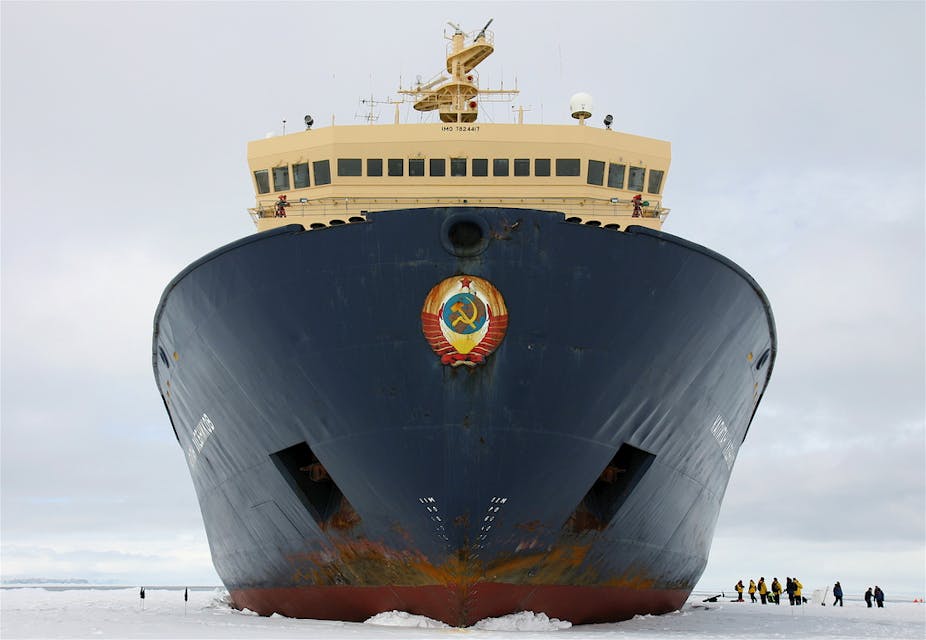When does “national interest” equal “national sovereignty”? Apparently when Australia looks south.
That position seems to be emerging from think tanks and senior government officials in the stop/start, semi-private debate about our interests in Antarctica. It’s radically different from the Australian public’s understanding of our role in the Great South Land. And it undermines our role in furthering good governance of the Antarctic.
Close your eyes and think of Antarctica. What do you see? Cold, white windswept wilderness, untouched emptiness unchanged since the dawn of time? A natural reserve devoted to peace and science? Perhaps penguins, a few intrepid explorers and scientists, or a place protected forever by the ultimate expression of humanity, the Antarctic Treaty? The words “global stewardship” might even come to mind.
Think again.
There are those who believe, “when a nation feels its best interests will ultimately be served by doing so, the Protocol’s ban on Antarctic minerals activity will be broken.”
According to this weeks’ Lowy Institute policy brief Australia falls into this camp, and we should be seriously thinking of strengthening our claims to sovereignty in Antarctica.
This echoes elements of the 2007 Australian Strategic Policy Institute Strategic Insight paper.

The openly stated implication is that we can no longer rely on the Antarctic Treaty System to protect our interests. Further, we should consider that our national security is tied to future uses (read exploitation) of Antarctica.
This is a significant shift in our approach.
What has changed? Antarctica has begun to be seen by some in Australia as a potential source of national wealth (oil and gas, minerals and fish).
Why? Because other powers (primarily Russia and China, but several others as well) have been flexing their rhetorical muscles with similar statements.
This is straining the normally staid polar bureaucracy. To quote the Lowy brief, “the current framework for Antarctica’s cooperative international administration is likely to come under increasing strain and may not be sustainable.”
The driver for such a lack of sustainability of the Treaty System is the potential for resource access and the sovereign wealth that flows from it: the current rush for oil and gas in the Arctic is predicated on “undiscovered resources” of 90 billion barrels of oil and additional gas, so the equivalent (alleged) 200 billion barrels (50 billion in the Ross and Wedell Seas alone) is almost impossibly attractive.
The implications of opening Antarctic to resource exploitation are profound, but the possibilities have yet to be tested.
Are these threats to Antarctica’s unique system of governance real? Perhaps.
If so what position should Australia take? Australia’s bureaucrats and think tanks seem fixated on the word “sovereignty” with all it implies. And that is creating significant waves in diplomatic circles around the world.
Critically, what has yet to be adequately defined on the domestic front are “Australia’s interests” in Antarctica, or how they could be maintained.
Definition of these interests requires an open discussion of two issues.
First, what does Australia see as the most desirable future for a continent that has been governed quite successfully for 50 years without national sovereignty? This is not just about governance, but also about environmental and scientific goals, as well as some vision for possible global futures.
Second, how does Australia integrate the different benefits that arise from the variety of Antarctic policy arenas? This may crudely be seen as balancing traditional security or resource interests with more far-reaching considerations of global peace or collective governance.

Consider a set of alternative futures.
Number One: The arguments of the developing world prevail within the Antarctic Treaty System, Antarctica is regarded as the common heritage of mankind, and the resources of the continent are divided equally between all nations. Australia loses almost everything it claims.
Number Two: The Treaty System breaks down, there is a resource grab by numerous great powers, and Antarctica becomes the world’s new quarry. Without doubt Australia would be unable to maintain its hold over 42% of the land surface and could be pushed out of Antarctica altogether.
Number Three: Australia works to build improved governance along the lines of the Antarctic Treaty System, developing a natural reserve, a pole of peace and science. Territorial claims remain suspended, but countries work together in a world becoming ravaged by the impacts of climate change.
Number Four: Australia works within the Treaty System, strengthening our role as an internationalist in Antarctica, providing services, education and research facilities, and developing a more shared global vision for the future of Antarctica.
These four are random possibilities among a broad spectrum of feasible options. The point is that each one has important consequences for Australia’s future.
They make clear that “national interest” is not synonymous with “sovereignty”. Neoimperialist or exploitation-fed visions by any country in Antarctica seem unlikely to end well for Australia.
Raising our level of international engagement, rethinking our internal Antarctic policy arrangements, and radically increasing our presence in Antarctica are all welcome, and arguably necessary, contributions to the debate on Australia’s Antarctic policy.
They are not contingent on one’s views about sovereignty. Failure to escape from the realist trap of seeing Antarctica as just another prize for the nation state, however, does not bode well for Australia’s national interest. Our fellow Antarctic Treaty partners are watching with dismay.

